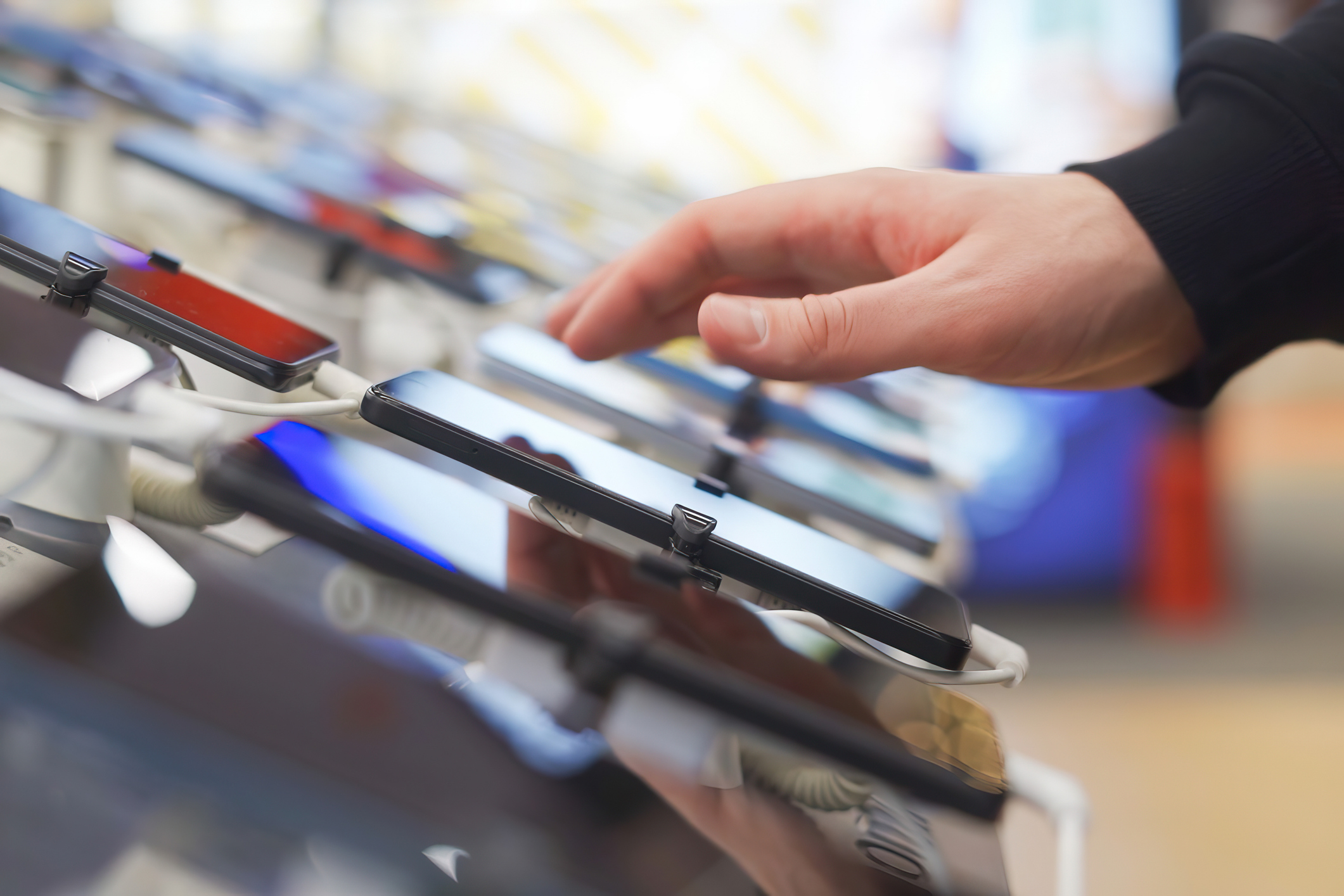How to Find Deals on Electronics Amid Tariffs
Beat tariff-related price rises and find deals on electronics using these expert shopping tips for everything from smartphones to TVs, laptops and tablets.







Profit and prosper with the best of Kiplinger's advice on investing, taxes, retirement, personal finance and much more. Delivered daily. Enter your email in the box and click Sign Me Up.
You are now subscribed
Your newsletter sign-up was successful
Want to add more newsletters?

Delivered daily
Kiplinger Today
Profit and prosper with the best of Kiplinger's advice on investing, taxes, retirement, personal finance and much more delivered daily. Smart money moves start here.

Sent five days a week
Kiplinger A Step Ahead
Get practical help to make better financial decisions in your everyday life, from spending to savings on top deals.

Delivered daily
Kiplinger Closing Bell
Get today's biggest financial and investing headlines delivered to your inbox every day the U.S. stock market is open.

Sent twice a week
Kiplinger Adviser Intel
Financial pros across the country share best practices and fresh tactics to preserve and grow your wealth.

Delivered weekly
Kiplinger Tax Tips
Trim your federal and state tax bills with practical tax-planning and tax-cutting strategies.

Sent twice a week
Kiplinger Retirement Tips
Your twice-a-week guide to planning and enjoying a financially secure and richly rewarding retirement

Sent bimonthly.
Kiplinger Adviser Angle
Insights for advisers, wealth managers and other financial professionals.

Sent twice a week
Kiplinger Investing Weekly
Your twice-a-week roundup of promising stocks, funds, companies and industries you should consider, ones you should avoid, and why.

Sent weekly for six weeks
Kiplinger Invest for Retirement
Your step-by-step six-part series on how to invest for retirement, from devising a successful strategy to exactly which investments to choose.
It’s always a good time to get a good deal. But as tariffs take effect on some imported goods — and as the Trump administration continues to negotiate tariffs with other countries — you may be especially interested right now in how you can save money while you shop.
Kiplinger Personal Finance Magazine has taken the time to assess how you can find deals this year on investments, groceries, electronics, clothing, cars and travel, as well as how to take advantage of credit card perks — with a special emphasis on finding deals for products and services most prone to rising prices as the trade war evolves. In this article, we look at deals on electronics. (See below to find links to our other articles about deals.)
You’ll likely find the best deals on smartphones, TVs, laptops, tablets and other gadgets by shopping during retail holidays.
From just $107.88 $24.99 for Kiplinger Personal Finance
Become a smarter, better informed investor. Subscribe from just $107.88 $24.99, plus get up to 4 Special Issues

Sign up for Kiplinger’s Free Newsletters
Profit and prosper with the best of expert advice on investing, taxes, retirement, personal finance and more - straight to your e-mail.
Profit and prosper with the best of expert advice - straight to your e-mail.
Discounts of up to 50% on electronics are possible around Labor Day, says Louis Ramirez, deals editor-in-chief for tech-review website Tom’s Guide.
Amazon Prime Day, Black Friday and New Year’s sales are good times to shop for electronics, too.
You might also consider trading in your used device when you make a purchase. In addition to tariff-related price increases on new electronics, consumers will likely see a rise in the trade-in values for used devices, says Ramirez.
The trade-in value depends on the age, model and condition of your current device and varies widely; you can get as much as $800 to $1,000 or as little as $12 to $40 for your old device.
Devices from some brands retain their value longer than others. Laptops and tablets that are more than five years old often have minimal trade-in value.
But Apple devices tend to retain some value for five to seven years, says Ramirez.
The right credit card can put money back in your pocket with every purchase. See Kiplinger’s top picks for the best cashback cards, powered by Bankrate. Advertising disclosure.
Check out these devices
Shopping for previous-generation devices can be a great way to lock in low prices on quality electronics.
If you’re in the market for a new laptop or tablet, consider buying the 2024 MacBook Air (recently available for $800 at Best Buy) or the 2024 iPad Air (recently available for $499 at Walmart), rather than the 2025 models, which sell for $999 and $599, respectively.
Alternatively, opt for an AI-driven laptop. These laptops use software powered by artificial intelligence to enhance performance, user experience and functionality.
They’ve had a lukewarm reception from consumers, many of whom remain comfortable with PCs that don’t have these built-in AI features. So you can find significant markdowns on some AI laptops.
Acer, Dell, HP and Samsung are all lowering prices on their AI-driven models, says Ramirez.
For example, the Dell XPS 9350 Laptop with Copilot+ was recently available at Best Buy for $999, or $400 off its original price.
If you’re in the market for a TV, big-box stores such as Best Buy may be your best bet, especially around Labor Day.
Typically, you can get as much as $2,000 off select big-screen TVs from LG, Samsung and other brands during Best Buy’s Labor Day sale.
Amazon has also been known to sell smart TVs, such as the Insignia 24-inch F20 Series HD Fire TV, for as little as $65 on Labor Day.
Note: This item first appeared in Kiplinger Personal Finance Magazine, a monthly, trustworthy source of advice and guidance. Subscribe to help you make more money and keep more of the money you make here.
Related content
- Valuable (and Fun) Things You Can Get for Free
- Smart Ways to Save Money at Museums
- How to Find Deals on Travel in 2025
- Don't Miss Out on These Four Credit Card Benefits
- Three Ways to Find Deals in Your Investments This Year
- Three Ways to Spend Less on Groceries This Year
- Surprising Ways to Find Deals on Cars Despite Tariffs
- Strategies to Spend Less on Clothing and Online Shopping in 2025
Profit and prosper with the best of Kiplinger's advice on investing, taxes, retirement, personal finance and much more. Delivered daily. Enter your email in the box and click Sign Me Up.

Nellie joined Kiplinger in August 2011 after a seven-year stint in Hong Kong. There, she worked for the Wall Street Journal Asia, where as lifestyle editor, she launched and edited Scene Asia, an online guide to food, wine, entertainment and the arts in Asia. Prior to that, she was an editor at Weekend Journal, the Friday lifestyle section of the Wall Street Journal Asia. Kiplinger isn't Nellie's first foray into personal finance: She has also worked at SmartMoney (rising from fact-checker to senior writer), and she was a senior editor at Money.
-
 Over 65? Here's What the New $6K 'Senior Deduction' Means for Medicare IRMAA Costs
Over 65? Here's What the New $6K 'Senior Deduction' Means for Medicare IRMAA CostsTax Breaks A new deduction for people over age 65 has some thinking about Medicare premiums and MAGI strategy.
-
 U.S. Congress to End Emergency Tax Bill Over $6,000 Senior Deduction and Tip, Overtime Tax Breaks in D.C.
U.S. Congress to End Emergency Tax Bill Over $6,000 Senior Deduction and Tip, Overtime Tax Breaks in D.C.Tax Law Here's how taxpayers can amend their already-filed income tax returns amid a potentially looming legal battle on Capitol Hill.
-
 5 Investing Rules You Can Steal From Millennials
5 Investing Rules You Can Steal From MillennialsMillennials are reshaping the investing landscape. See how the tech-savvy generation is approaching capital markets – and the strategies you can take from them.
-
 I'm a Financial Planner: These Small Money Habits Stick (and Now Is the Perfect Time to Adopt Them)
I'm a Financial Planner: These Small Money Habits Stick (and Now Is the Perfect Time to Adopt Them)February gets a bad rap for being the month when resolutions fade — in fact, it's the perfect time to reset and focus on small changes that actually pay off.
-
 One of the Most Powerful Wealth-Building Moves a Woman Can Make: A Midcareer Pivot
One of the Most Powerful Wealth-Building Moves a Woman Can Make: A Midcareer PivotIf it feels like you can't sustain what you're doing for the next 20 years, it's time for an honest look at what's draining you and what energizes you.
-
 I'm a Wealth Adviser Obsessed With Mahjong: Here Are 8 Ways It Can Teach Us How to Manage Our Money
I'm a Wealth Adviser Obsessed With Mahjong: Here Are 8 Ways It Can Teach Us How to Manage Our MoneyThis increasingly popular Chinese game can teach us not only how to help manage our money but also how important it is to connect with other people.
-
 Looking for a Financial Book That Won't Put Your Young Adult to Sleep? This One Makes 'Cents'
Looking for a Financial Book That Won't Put Your Young Adult to Sleep? This One Makes 'Cents'"Wealth Your Way" by Cosmo DeStefano offers a highly accessible guide for young adults and their parents on building wealth through simple, consistent habits.
-
 My Spouse and I Are Saving Money for a Down Payment on a House. Which Savings Account is the Best Way to Reach Our Goal?
My Spouse and I Are Saving Money for a Down Payment on a House. Which Savings Account is the Best Way to Reach Our Goal?Learn how timing matters when it comes to choosing the right account.
-
 We're 78 and Want to Use Our 2026 RMD to Treat Our Kids and Grandkids to a Vacation. How Should We Approach This?
We're 78 and Want to Use Our 2026 RMD to Treat Our Kids and Grandkids to a Vacation. How Should We Approach This?An extended family vacation can be a fun and bonding experience if planned well. Here are tips from travel experts.
-
 My First $1 Million: Retired From Real Estate, 75, San Francisco
My First $1 Million: Retired From Real Estate, 75, San FranciscoEver wonder how someone who's made a million dollars or more did it? Kiplinger's My First $1 Million series uncovers the answers.
-
 To Love, Honor and Make Financial Decisions as Equal Partners
To Love, Honor and Make Financial Decisions as Equal PartnersEnsuring both partners are engaged in financial decisions isn't just about fairness — it's a risk-management strategy that protects against costly crises.
